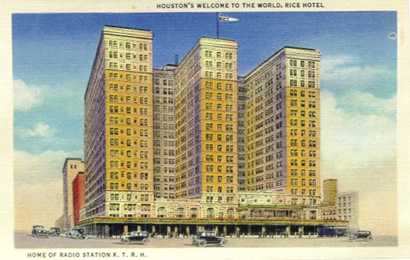|
|
Everyone
loves a murder mystery, especially if the murder happened a long time
ago and did not involve someone they know. The story of William Marsh
Rice's demise is such a case, especially since I am a beneficiary
of his will. Let me explain.
William Marsh Rice was born in Springfield, Massachusetts, in 1816.
Rice revealed shrewd business acumen, even as a youth. He moved to
Houston, Texas, in 1837,
fleeing the Panic of 1837 and seeking his fortune in the Republic
of Texas.
Rice began his business career in Texas
selling liquor in the bar of the Milam Hotel in Houston,
but soon became a merchant, an importer-exporter, railroad-promoter
and investor, cotton ginner and shipper, landowner-just about anything
that turned a buck. Although Rice owned slaves, he favored the Union
side in the Civil War. He left Houston
for Matamoras during the conflict-still in the cotton
trade-but moved to New Jersey afterwards and finally to New York City
before the century ended, though he retained investments in Houston,
which eventually included the Rice Hotel. Along the way Rice amassed
a fortune that exceeded $3 million. |
 |
Rice Hotel
Postcard courtesy rootsweb.com/%7Etxpstcrd/ |
| Rice
was married twice, but childless, so he left the bulk of his estate
to establish The William Marsh Rice Institute "for the advancement
of literature, science, and art." The Institute was supposed to be
located in New Jersey and reserved for white males who attended without
tuition. |
Administration
Building, Rice Institute
Postcard courtesy rootsweb.com/%7Etxpstcrd/ |
Rice
was murdered by his valet, Charles Jones, and an attorney, Albert
T. Patrick. Patrick forged papers to gain control of the estate and
the butler did the deed and expected to profit as a beneficiary of
Rice's will.
Houston associates, especially James Baker, successfully fought Patrick
and gained control of the estate. The governors of the Rice Institute
broke the will to locate the institution in Houston,
nearer its assets than New Jersey; later courts decided to adjust
the will to admit women, then African Americans, to change its name
to Rice University, and finally to charge tuition. |
The "New"
Rice Stadium in 1951
Postcard courtesy rootsweb.com/%7Etxpstcrd/ |
Here
is how I, even I, became a beneficiary of William Marsh Rice's will.
In 1958, someone made a mistake and admitted me to the Institute's
graduate program. Greatest educational bargain imaginable. I paid
a $75 "registration fee"-not tuition, and that included passes to
athletic competitions, campus newspaper subscription, and I don't
know what all. That hardly would pay for a single hour of instruction
today.
© Archie
P. McDonald, PhD
All
Things Historical › October 9, 2006 column
A syndicated column in over 40 East Texas newspapers
This column is provided as a public service by the East Texas Historical
Association. Archie P. McDonald is director of the Association and
author of more than 20 books on Texas. |
|
|
